Towards a Unified Virtual Business Incubator Model: A Systematic Literature Review and Bibliometric Analysis
Abstract
1. Introduction
- How has academic research concerning virtual business incubators’ development evolved?
- Which virtual business incubator models exist, and how do they organize to support their tenants with business creation and development?
- Which virtual business incubator model is more suitable to support the process of digital businesses or startup creation?
2. Materials and Methods
3. Results
3.1. Bibliometric Analysis
3.1.1. Scientific Production
3.1.2. Main Sources of the Screened Scientific Records
3.1.3. Thematic Evolution
3.1.4. Thematic Map
- Three clusters in the upper-right quadrant represent the motor themes related to the field of virtual business incubators models, meaning they have central importance in the progress of this research field. These clusters include the following themes: “virtual incubator”, “e-learning”, and “collaborative learning environment”; “ecosystem”, “information and communication technologies”, and “industry”; and “sustainability”, “circular economy”, and “digital innovation”.
- Three clusters in the lower-right quadrant have high centrality but are not well-developed, representing basic and transversal themes, namely “entrepreneurship”, “innovation”, and “startups”, “venture capital”, and “digitalization”.
- Two clusters in the upper-left quadrant, related to “growth”, “society”, and “technology”; and “science parks” and “technology transfer”, have very specialized and well-developed themes, with strong connections between them but with only marginal importance for advancing this field of research.
- Two clusters in the lower-left quadrant have both low density and low centrality, meaning that the themes concerning “creativity”, “technology incubator”, and “business model” have the potential to turn themselves into emerging themes, which could be determinants of the future development of this research field.
- Three other clusters emerged from the thematic map, having the same density but almost opposed centrality. The location of the cluster with the themes “business incubators” and “business incubation” allows us to draw conclusions about their importance for the research field, although they are not well-developed yet and deserve more attention in the future. On the left side, the two overlay clusters containing the themes (1) “knowledge management” and “collective intelligence”, and (2) “refugee entrepreneurship” and “small and medium-sized enterprises”, tend towards niche themes that could also be further explored to advance the research of digital business incubator models.
3.2. Systematic Literature Review Based on Content Analysis
4. Discussion
4.1. How Has Academic Research concerning Virtual Business Incubators’ Development Evolved?
4.2. Which Virtual Business Incubator Models Exist, and How Do They Organize to Support Their Tenants with Business Creation and Development?
4.3. Whitch Virtual Business Incubator Model Is More Suitable to Support the Process of Digital Businesses or Startups Creation?
5. Conclusions
Author Contributions
Funding
Institutional Review Board Statement
Informed Consent Statement
Data Availability Statement
Conflicts of Interest
Appendix A
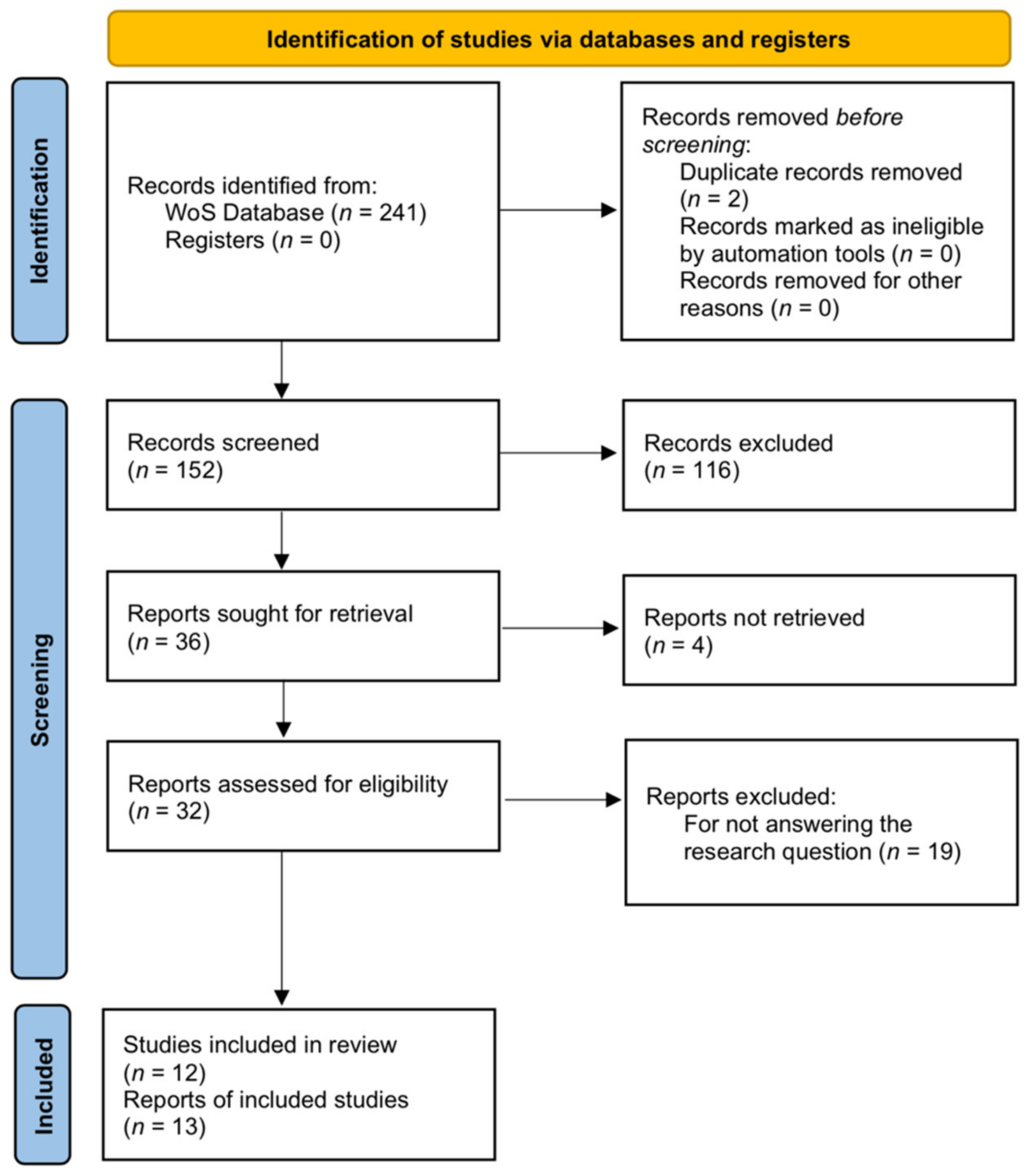
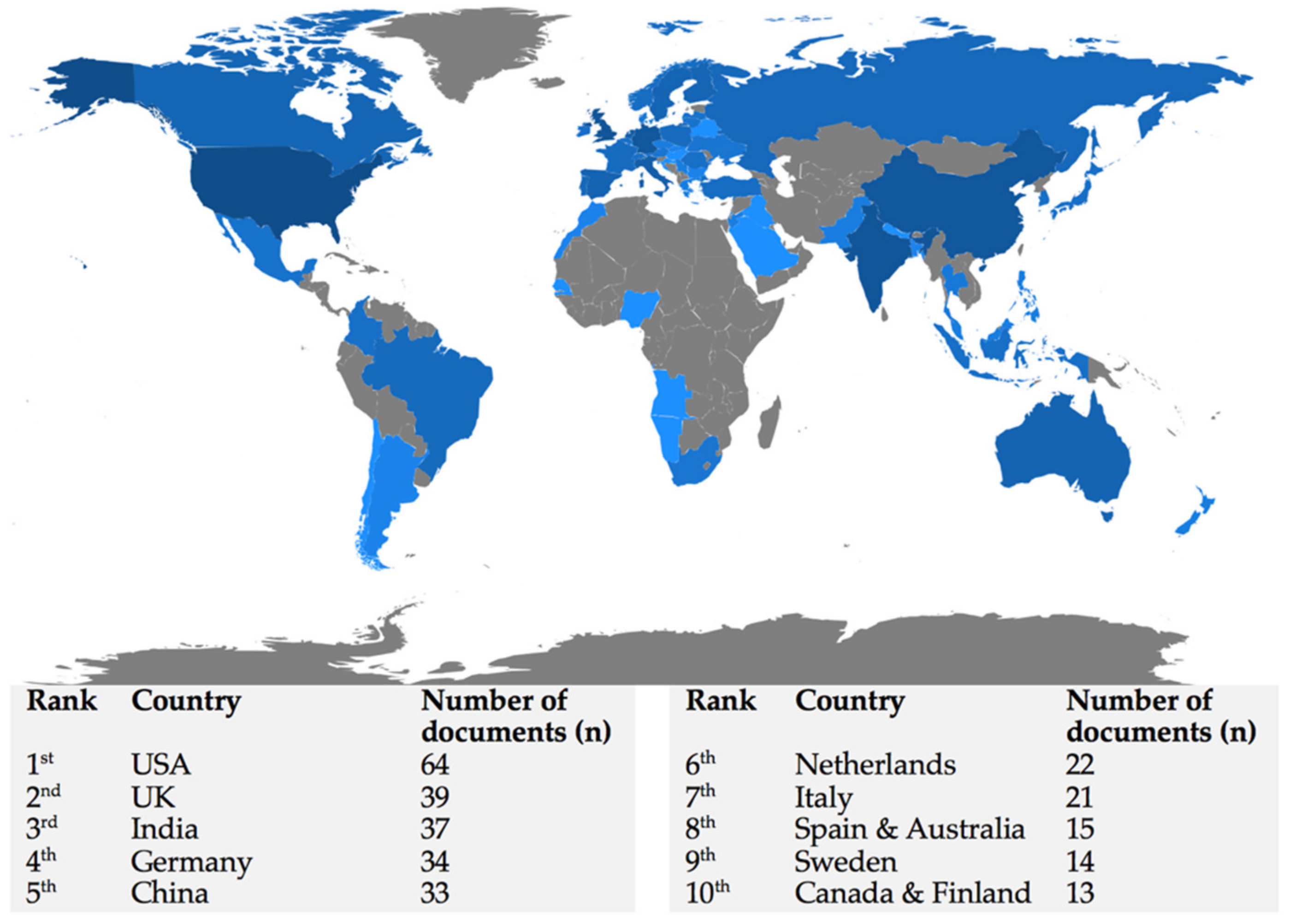
References
- Zahra, S.A.; Wright, M. Understanding the Social Role of Entrepreneurship. J. Manag. Stud. 2016, 53, 610–629. [Google Scholar] [CrossRef]
- Sansone, G.; Andreotti, P.; Colombelli, A.; Landoni, P. Are Social Incubators Different from Other Incubators? Evidence from Italy. Technol. Forecast. Soc. Change 2020, 158, 120132. [Google Scholar] [CrossRef]
- Ririh, K.R.; Wicaksono, A.; Laili, N.; Tsurayya, S. Incubation Scheme in Among Incubators: A Comparative Study. Int. J. Innov. Technol. Manag. 2020, 17, 20500522. [Google Scholar] [CrossRef]
- de Oliveira, P.H.; Terence, A.C. Innovation Practices in Small Technology-Based Companies during Incubation and Post-Incubation Periods. Innov. Manag. Rev. 2018, 15, 174–188. [Google Scholar] [CrossRef]
- Ratinho, T.; Henriques, E. The Role of Science Parks and Business Incubators in Converging Countries: Evidence from Portugal. Technovation 2010, 30, 278–290. [Google Scholar] [CrossRef]
- Aerts, K.; Matthyssens, P.; Vandenbempt, K. Critical Role and Screening Practices of European Business Incubators. Technovation 2007, 27, 254–267. [Google Scholar] [CrossRef]
- Mian, S.; Lamine, W.; Fayolle, A. Technology Business Incubation: An Overview of the State of Knowledge. Technovation 2016, 50–51, 1–12. [Google Scholar] [CrossRef]
- Lamine, W.; Mian, S.; Fayolle, A.; Wright, M.; Klofsten, M.; Etzkowitz, H. Technology Business Incubation Mechanisms and Sustainable Regional Development. J. Technol. Transf. 2018, 43, 1121–1141. [Google Scholar] [CrossRef]
- Yin, B.; Luo, J. How Do Accelerators Select Startups? Shifting Decision Criteria across Stages. IEEE Trans. Eng. Manag. 2018, 65, 574–589. [Google Scholar] [CrossRef]
- Schutte, F.; Direng, T. Incubation of Entrepreneurs Contributes to Business Growth and Job Creation: A Botswana Case Study. Acad. Entrep. J. 2019, 5, 1–17. [Google Scholar]
- Grimaldi, R.; Grandi, A. Business Incubators and New Venture Creation: An Assessment of Incubating Models. Technovation 2005, 25, 111–121. [Google Scholar] [CrossRef]
- International Data Corporation. Startup & Entrepreneurial Ecosystem Report, Portugal 2021; International Data Corporation: Lisbon, Portugal, 2021. [Google Scholar]
- Tang, M.; Walsh, G.S.; Li, C.; Baskaran, A. Exploring Technology Business Incubators and Their Business Incubation Models: Case Studies from China. J. Technol. Transf. 2021, 46, 90–116. [Google Scholar] [CrossRef]
- Hausberg, J.P.; Korreck, S. Business Incubators and Accelerators: A Co-Citation Analysis-Based, Systematic Literature Review. J. Technol. Transf. 2020, 45, 151–176. [Google Scholar] [CrossRef]
- Indiran, L.; Khalifah, Z.; Ismail, K. A Historical Review of Business Incubation Models. In Proceedings of the 4th International Seminar on Entrepreneurship and Business, Universiti Malaysia Kelantan, Penang, Malaysia, 17 October 2015; pp. 733–751. [Google Scholar]
- Choi, J.C. User Familiarity and Satisfaction with Food Delivery Mobile Apps. Sage Open 2020, 10, 215824402097056. [Google Scholar] [CrossRef]
- Reit, T. Knowledge Transfer in Virtual Business Incubators. Probl. Zarządzania-Manag. Issues 2022, 20, 173–190. [Google Scholar] [CrossRef]
- Bergek, A.; Norrman, C. Incubator Best Practice: A Framework. Technovation 2008, 28, 20–28. [Google Scholar] [CrossRef]
- George, G.; Bock, A.J. The Business Model in Practice and Its Implications for Entrepreneurship Research. Entrep. Theory Pract. 2011, 35, 83–111. [Google Scholar] [CrossRef]
- Amit, R.; Zott, C. Value Creation in E-Business. Strateg. Manag. J. 2001, 22, 493–520. [Google Scholar] [CrossRef]
- Pulsiri, N.; Vatananan-Thesenvitz, R. Improving Systematic Literature Review with Automation and Bibliometrics. In Proceedings of the 2018 Portland International Conference on Management of Engineering and Technology (PICMET), Honolulu, HI, USA, 19–23 August 2018; pp. 1–8. [Google Scholar] [CrossRef]
- Aria, M.; Cuccurullo, C. Bibliometrix: An R-Tool for Comprehensive Science Mapping Analysis. J. Informetr. 2017, 11, 959–975. [Google Scholar] [CrossRef]
- Radu, V.; Radu, F.; Tabirca, A.I.; Saplacan, S.I.; Lile, R. Bibliometric Analysis of Fuzzy Logic Research in International Scientific Databases. Int. J. Comput. Control 2021, 16, 4120. [Google Scholar] [CrossRef]
- Impellizzeri, F.M.; Bizzini, M. Systematic Review and Meta-Analysis: A Primer. Int. J. Sports Phys. Ther. 2012, 7, 493–503. [Google Scholar]
- Page, M.J.; McKenzie, J.E.; Bossuyt, P.M.; Boutron, I.; Hoffmann, T.C.; Mulrow, C.D.; Shamseer, L.; Tetzlaff, J.M.; Akl, E.A.; Brennan, S.E.; et al. The PRISMA 2020 Statement: An Updated Guideline for Reporting Systematic Reviews. BMJ 2021, 372, n71. [Google Scholar] [CrossRef]
- Albort-Morant, G.; Ribeiro-Soriano, D. A Bibliometric Analysis of International Impact of Business Incubators. J. Bus. Res. 2016, 69, 1775–1779. [Google Scholar] [CrossRef]
- Callon, M.; Courtial, J.P.; Laville, F. Co-Word Analysis as a Tool for Describing the Network of Interactions between Basic and Technological Research: The Case of Polymer Chemsitry. Scientometrics 1991, 22, 155–205. [Google Scholar] [CrossRef]
- Cobo, M.J.; López-Herrera, A.G.; Herrera-Viedma, E.; Herrera, F. An Approach for Detecting, Quantifying, and Visualizing the Evolution of a Research Field: A Practical Application to the Fuzzy Sets Theory Field. J. Informetr. 2011, 5, 146–166. [Google Scholar] [CrossRef]
- Nowak, M.J.; Grantham, C.E. The Virtual Incubator: Managing Human Capital in the Software Industry. Res. Policy 2000, 29, 125–134. [Google Scholar] [CrossRef]
- Tzafestas, S. The Art and Impact of Physical and Virtual Enterprise Incubators: The Greek Paradigm. In Open Knowledge Society: A Computer Science and Information Systems Manifesto; Lytras, M.D., Carroll, J.M., Damiani, E., Avison, D., Vossen, G., OrdonezDePablos, P., Eds.; Communications in Computer and Information Science; Springer: Berlin/Heidelberg, Germany, 2008; Volume 19, pp. 549–559. [Google Scholar]
- Joita, A.C.; Carutasu, G.; Botezatu, C.P. Technology and Business Incubator Centers—Adding Support to Small and Medium Enterprises in the Information Society. In Economic World Destiny: Crisis and Globalization? Section V: Economic Information Technology in the Avant-Garde of Economic Development; Lucian Blaga University of Sibiu: Sibiu, Romania, 2010; pp. 107–115. [Google Scholar]
- Pirker, J.; Guetl, C. Iterative Evaluation of a Virtual Three-Dimensional Environment for Start-Up Entrepreneurship in Different Application Scenarios. In Proceedings of the 2012 15th International Conference on Interactive Collaborative Learning (ICL), Villach, Austria, 26–28 September 2012. [Google Scholar]
- Guetl, C.; Pirker, J. Implementation and Evaluation of a Collaborative Learning, Training and Networking Environment for Start-Up Entrepreneurs in Virtual 3D Worlds. In Proceedings of the 2011 14th International Conference on Interactive Collaborative Learning (ICL), Piestany, Slovakia, 21–23 September 2011; pp. 58–66. [Google Scholar]
- Ciocoiu, C.N.; Colesca, S.E.; Pacesila, M.; Burcea, S.G. Designing A Weee Virtual Eco-Inovation Hub: The Vision of the Academic and Research Environment. In Proceedings of the 8th International Management Conference: Management Challenges for Sustainable Development, Bucharest, Romania, 6–7 November 2014; Popa, I., Dobrin, C., Ciocoiu, C.N., Eds.; International Management Conference. Editura Ase: Bucuresti, Romania, 2014; pp. 1128–1140. [Google Scholar]
- Unal, O.; Afsarmanesh, H.; Angelov, S. An Agile Innovation Framework Supported through Business Incubators. In Collaborative Systems for Smart Networked Environments; CamarinhaMatos, L.M., Afsarmanesh, H., Eds.; IFIP Advances in Information and Communication Technology; Springer: Berlin/Heidelberg, Germany, 2014; Volume 434, pp. 307–316. [Google Scholar]
- Agostinho, C.; Lampathaki, F.; Jardim-Goncalves, R.; Lazaro, O. Accelerating Web-Entrepreneurship in Local Incubation Environments. In Proceedings of the Advanced Information Systems Engineering Workshops, CAISE 2015, Stockholm, Sweden, 8–9 June 2015; Persson, A., Stirna, J., Eds.; Lecture Notes in Business Information Processing. Springer: Berlin/Heidelberg, Germany, 2015; Volume 215, pp. 183–194. [Google Scholar] [CrossRef]
- Elia, G.; Margherita, A. A Collective Intelligence Platform for Developing Technology Entrepreneurship Ecosystems. In Creating Technology-Driven Entrepreneurship; Carlucci, D., Spender, J.C., Schiuma, G., Eds.; Palgrave Macmillan: London, UK, 2016; pp. 195–220. [Google Scholar] [CrossRef]
- Tawil, N.M.; Halim, A.A.; Ramlee, S.; Arsad, N. Enhancing Small Medium Enterprises Opportunity through Online Portal System. In Proceedings of the 2016 International Conference on Advances in Electrical, Electronic and Systems Engineering (ICAEES), Putrajaya, Malaysia, 14–16 November 2016; pp. 631–635. [Google Scholar]
- Stevenson, B. Oulu Edulab: University-Managed, Interdisciplinary Edtech Incubator Program from Finland. In Proceedings of the 5th International Conference on Innovation and Entrepreneurship (ICIE 2017), Cyberjaya, Malaysia, 26–27 April 2017; Aziz, K.A., Ed.; Acad Conferences Ltd.: Reading, UK, 2017; pp. 140–144. [Google Scholar]
- Luik, J.; Ng, J.; Hook, J. Virtual Hubs Understanding Relational Aspects and Remediating Incubation. In Proceedings of the 2019 CHI Conference on Human Factors in Computing Systems, Glasgow, UK, 4–9 May 2019. [Google Scholar] [CrossRef]
- Harima, A.; Periac, F.; Murphy, T.; Picard, S. Entrepreneurial Opportunities of Refugees in Germany, France, and Ireland: Multiple Embeddedness Framework. Int. Entrep. Manag. J. 2021, 17, 625–663. [Google Scholar] [CrossRef]
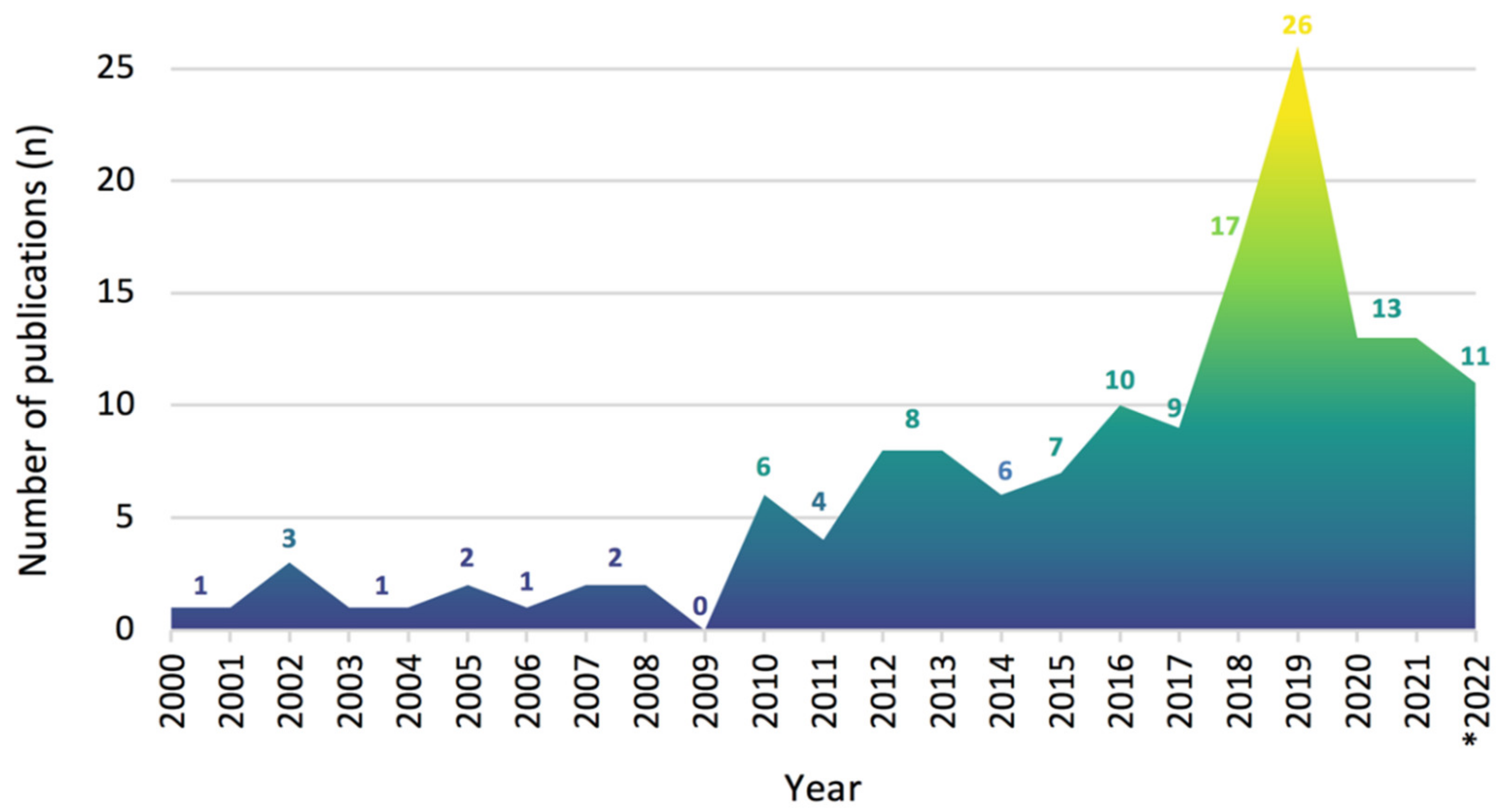
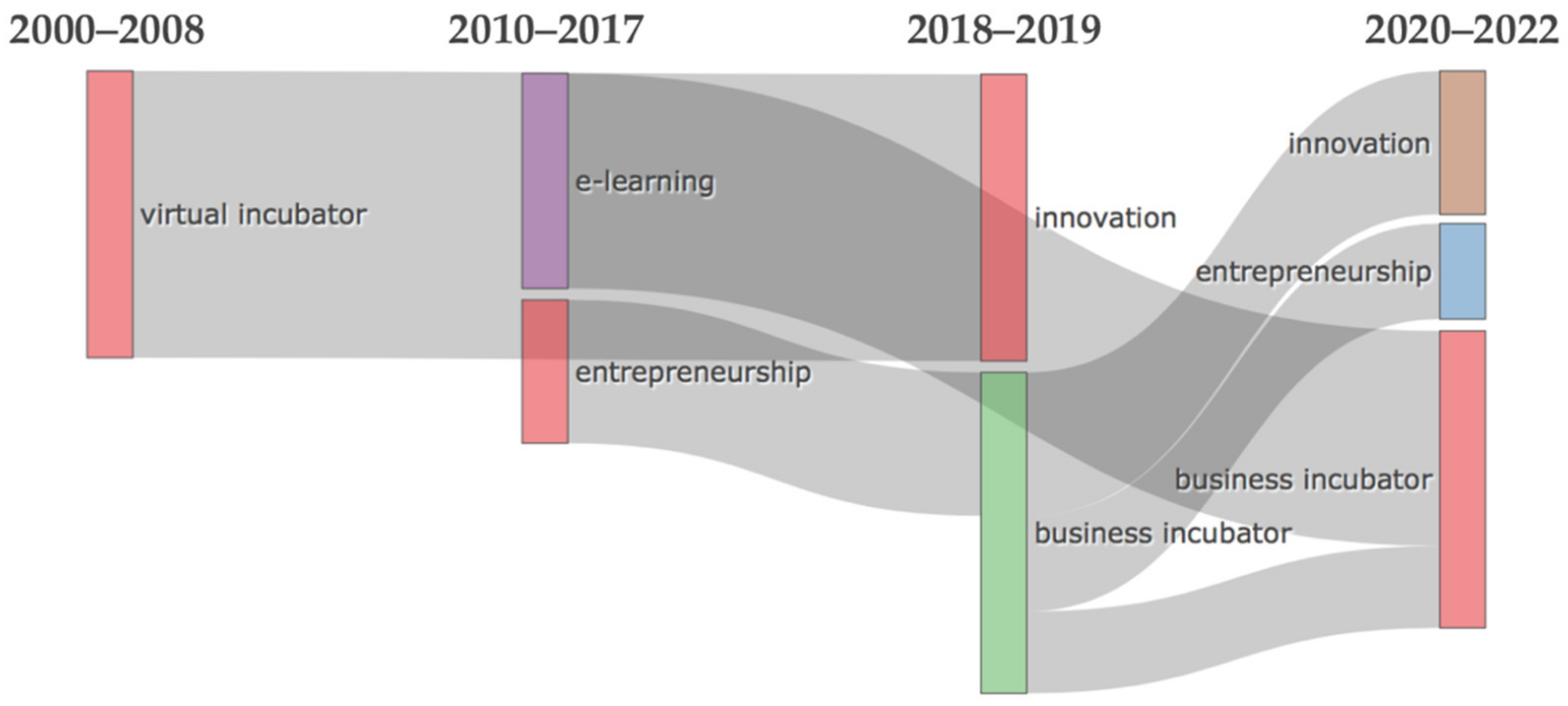
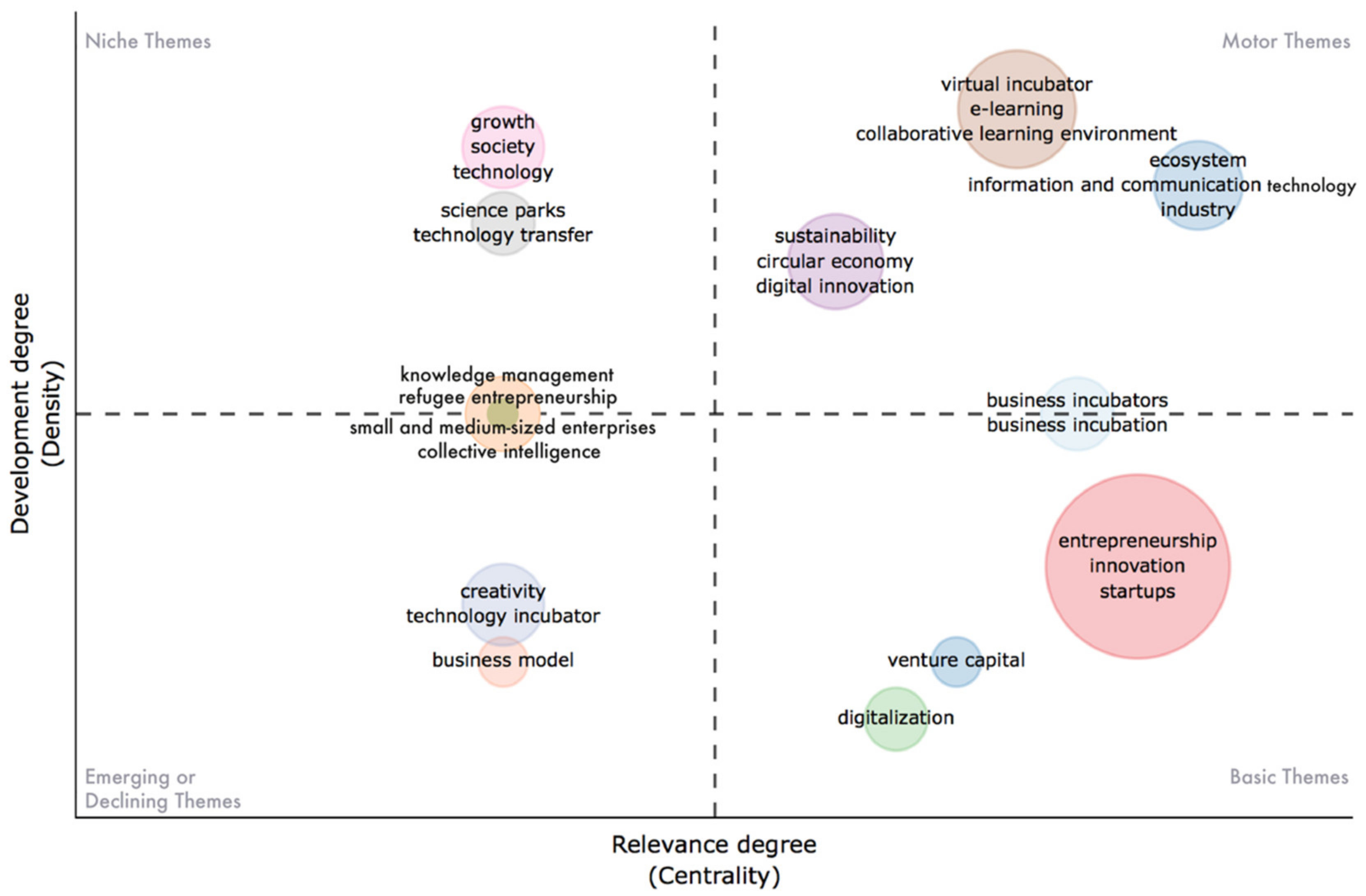
| Source | Citations (n) | Impact Factor * |
|---|---|---|
| Technovation | 171 | 11.373 |
| Journal of Business Venturing | 107 | 13.139 |
| Research Policy | 105 | 9.473 |
| Strategic Management Journal | 63 | 3.745 |
| Academy of Management Journal | 61 | 10.979 |
| Small Business Economics | 56 | 7.096 |
| The Journal of Technology Transfer | 48 | 5.337 |
| Academy of Management Review | 47 | 13.865 |
| Entrepreneurship Theory and Practice | 47 | 9.993 |
| Harvard Business Review | 46 | 6.87 |
| Authors | Study’s Country and Year | VBI’s Main Industries/Business/Society | Study’s Methods | VBI Model’s Dimensions for Digital Incubation |
|---|---|---|---|---|
| Nowak and Grantham [29] | United States of America, 2000 | Software industry | Case study |
|
| Tzafestas [30] | Greece, Italy, France, Czech Republic 2008 | Social economy | Case study |
|
| Joita, Carutasu, and Botezatu [31] | Romania, 2010 | Emergent economic agents (not specified) | No data available |
|
| Guetl and Pirker [32,33] | Austria, 2011, 2012 | n/d | Questionnaires |
|
| Ciocoiu, Colesca, Pacesila, and Burcea [34] | Romania, 2014 | e-Waste, recycling, and eco-innovation | Questionnaires (n = 43) |
|
| Unal, Afsarmanesh, and Angelov [35] | Netherlands, 2014 | Virtual organizations | Literature review |
|
| Agostinho, Lampathaki, Gonçalves, and Lazaro [36] | Portugal, Greece, and Spain, 2015 | Virtual organizations | Literature review |
|
| Elia and Margherita [37] | Italy, 2016 | Technology entrepreneurship | No data available |
|
| Tawil, Halim, Ramlee, and Arsad [38] | Malaysia, 2016 | Local entrepreneurs (varied business types) | Literature review |
|
| Stevenson [39] | Finland, 2017 | Education technology (EdTech) industry | Case study |
|
| Luik, Ng, and Hook [40] | United Kingdom, 2019 | Creative industry |
|
|
| Harima, Periac, Murphy, and Picard [41] | Germany, France, and Ireland, 2020 | Refugee entrepreneurship (varied business types) | Semi-structured interviews with refugee entrepreneurs (n = 50) |
|
| Authors | Organization and Management Perspective | Information and Communication Systems Perspective | User Experience and Engagement Perspective |
|---|---|---|---|
| Nowak and Grantham [29] | X | — | — |
| Tzafestas [30] | X | — | — |
| Joita, Carutasu, and Botezatu [31] | X | X | — |
| Guetl and Pirker [32,33] | — | X | X |
| Ciocoiu, Colesca, Pacesila, and Burcea [34] | X | — | — |
| Unal, Afsarmanesh, and Angelov [35] | X | X | — |
| Agostinho, Lampathaki, Gonçalves, and Lazaro [36] | X | X | — |
| Elia and Margherita [37] | X | X | — |
| Tawil, Halim, Ramlee, and Arsad [38] | X | X | X |
| Stevenson [39] | X | — | — |
| Luik, Ng, and Hook [40] | X | X | X |
| Harima, Periac, Murphy, and Picard [41] | X | — | — |
Publisher’s Note: MDPI stays neutral with regard to jurisdictional claims in published maps and institutional affiliations. |
© 2022 by the authors. Licensee MDPI, Basel, Switzerland. This article is an open access article distributed under the terms and conditions of the Creative Commons Attribution (CC BY) license (https://creativecommons.org/licenses/by/4.0/).
Share and Cite
Vaz, R.; de Carvalho, J.V.; Teixeira, S.F. Towards a Unified Virtual Business Incubator Model: A Systematic Literature Review and Bibliometric Analysis. Sustainability 2022, 14, 13205. https://doi.org/10.3390/su142013205
Vaz R, de Carvalho JV, Teixeira SF. Towards a Unified Virtual Business Incubator Model: A Systematic Literature Review and Bibliometric Analysis. Sustainability. 2022; 14(20):13205. https://doi.org/10.3390/su142013205
Chicago/Turabian StyleVaz, Roberto, João Vidal de Carvalho, and Sandrina Francisca Teixeira. 2022. "Towards a Unified Virtual Business Incubator Model: A Systematic Literature Review and Bibliometric Analysis" Sustainability 14, no. 20: 13205. https://doi.org/10.3390/su142013205
APA StyleVaz, R., de Carvalho, J. V., & Teixeira, S. F. (2022). Towards a Unified Virtual Business Incubator Model: A Systematic Literature Review and Bibliometric Analysis. Sustainability, 14(20), 13205. https://doi.org/10.3390/su142013205









